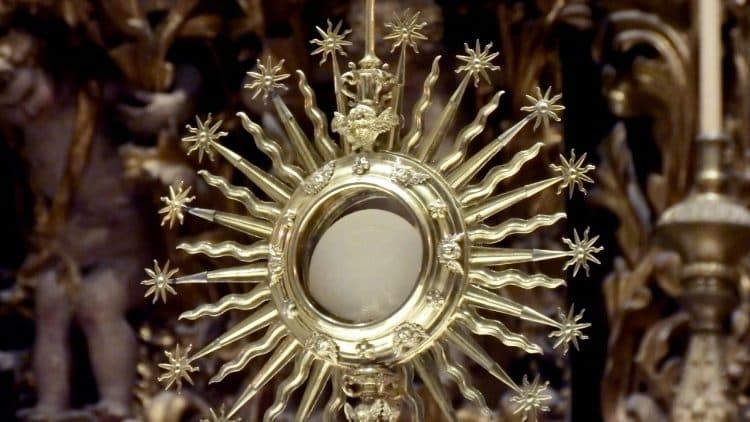There are many different ways of praying.
After giving a strong foundation to its teachings on prayer, the Catechism of the Catholic Church shifts and begins to dissect the many different ways of approaching God in prayer.
Before we can talk about other types of prayer, we have to begin with the most basic form of prayer, namely, blessing and adoration. This is the highest form of prayer since blessing and adoration establish who God is and who we are. It directs our hearts to acknowledge God as sovereign, majestic, and full of splendor and glory.
It’s no surprise then that the Catechism has much to say about blessing and adoration. We need this instruction and guidance as we seek to approach God in prayer, which is an active speaking and listening to him.
The Catechism begins: “Blessing expresses the basic movement of Christian prayer: it is an encounter between God and man. In blessing, God’s gift and man’s acceptance of it are united in dialogue with each other. The prayer of blessing is man’s response to God’s gifts: because God blesses, the human heart can in return bless the One who is the source of every blessing.”
The Catechism presents an interesting dynamic of love as it teaches about blessing and adoration. The desire to bless and adore God is God’s gift to us and our response to it is the opening of a dialogue between our heart and his. God blesses us and then gives us the grace to bless him.
There are two fundamental forms to express this movement of blessing and adoration, as the Catechism further teaches us: “Our prayer ascends in the Holy Spirit through Christ to the Father – we bless him for having blessed us; it implores the grace of the Holy Spirit that descends through Christ from the Father – he blesses us.”
The movement of blessing and adoration is fluid and simultaneous. In such a movement, the entire Godhead is involved as creation is blessed and creation – by God’s grace – gives a blessing to him. Our prayer is nurtured by the Holy Spirit and is placed before the Father through Jesus Christ.
This is the spiritual process by which we can bless and adore God. This is the spiritual means by which we can bless the One who has blessed us. In return, the Father gives us his blessing through Jesus Christ as pours it upon us in the Holy Spirit.
The process of blessing and adoration is a communion of love, an interactive dynamism that allows us to be a part of the very life of God as he blesses us and empowers us to bless him.
The Catechism continues by reminding us that such a path of blessing is only given by God’s goodness: “Adoration is the first attitude of man acknowledging that he is a creature before his Creator.”
It is God’s loving kindness and benevolence towards us that allows us to bless and adore him. We are creatures who have been made children. We have been given a voice and an ability to lift up our hearts and adore and bless God our Creator. This is an amazing gift.
Using again the dynamism of the Holy Trinity, the Catechism explains: “[Adoration] exalts the greatness of the Lord who made us and the almighty power of the Savior who sets us free from evil. Adoration is homage of the spirit to the ‘King of Glory,’ respectful silence in the presence of the ‘ever greater’ God.”
Our blessing adoration are directed to God who is a Trinity. Our blessing and adoration involve us, includes us, in the very action of God in his inner life. It is solely by God’s favor, his unmerited grace that is freely given to us, that we can be with him and offer adoration that is noble and true.
The Catechism summarizes its teachings: “Adoration of the thrice-holy and sovereign God of love blends with humility and gives assurance to our supplications.”
The ability we have to bless and adore God should fill us with tremendous humility. Who are we to be given such power? And the reality is that we are creatures who have been made sons and daughters. Through Jesus Christ, and in the fellowship of the Holy Spirit, we have been invited into the Father’s house and have been gives a heart and a voice to bless and adore the living God in all his majesty and splendor.













